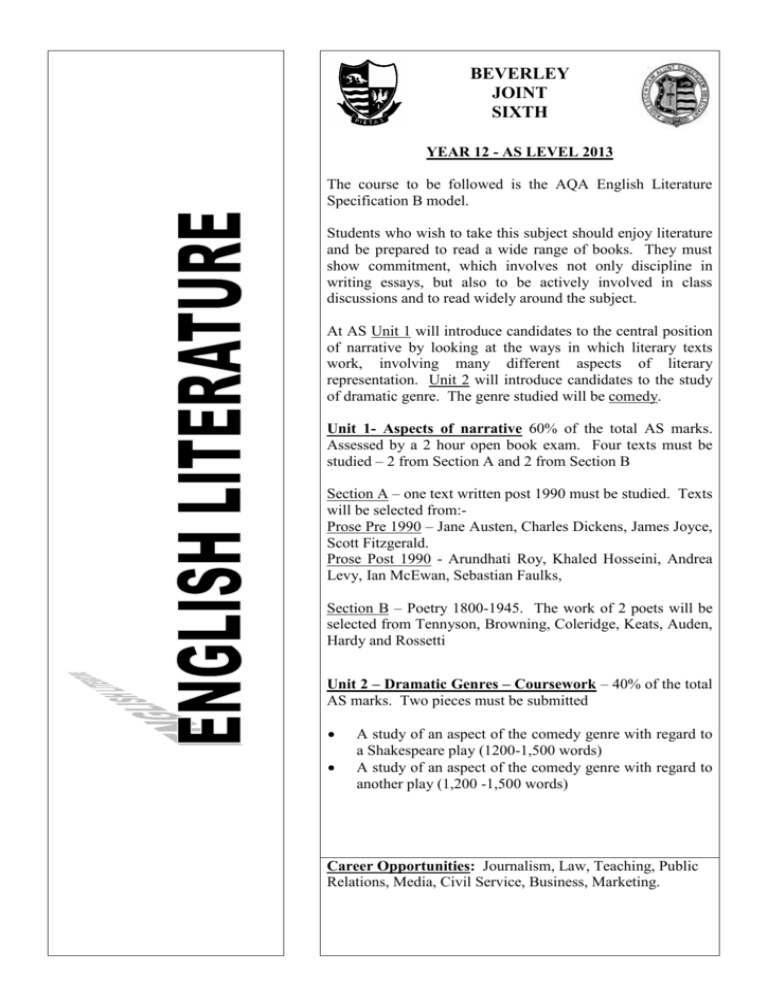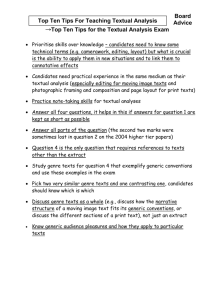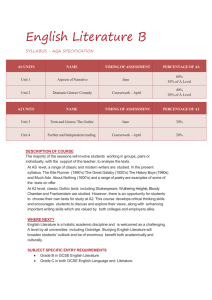English Literature
advertisement

BEVERLEY JOINT SIXTH YEAR 12 - AS LEVEL 2013 The course to be followed is the AQA English Literature Specification B model. Students who wish to take this subject should enjoy literature and be prepared to read a wide range of books. They must show commitment, which involves not only discipline in writing essays, but also to be actively involved in class discussions and to read widely around the subject. At AS Unit 1 will introduce candidates to the central position of narrative by looking at the ways in which literary texts work, involving many different aspects of literary representation. Unit 2 will introduce candidates to the study of dramatic genre. The genre studied will be comedy. Unit 1- Aspects of narrative 60% of the total AS marks. Assessed by a 2 hour open book exam. Four texts must be studied – 2 from Section A and 2 from Section B Section A – one text written post 1990 must be studied. Texts will be selected from:Prose Pre 1990 – Jane Austen, Charles Dickens, James Joyce, Scott Fitzgerald. Prose Post 1990 - Arundhati Roy, Khaled Hosseini, Andrea Levy, Ian McEwan, Sebastian Faulks, Section B – Poetry 1800-1945. The work of 2 poets will be selected from Tennyson, Browning, Coleridge, Keats, Auden, Hardy and Rossetti Unit 2 – Dramatic Genres – Coursework – 40% of the total AS marks. Two pieces must be submitted A study of an aspect of the comedy genre with regard to a Shakespeare play (1200-1,500 words) A study of an aspect of the comedy genre with regard to another play (1,200 -1,500 words) Career Opportunities: Journalism, Law, Teaching, Public Relations, Media, Civil Service, Business, Marketing. BEVERLEY JOINT SIXTH YEAR 13 - A2 LEVEL The course to be followed is the AQA English Literature Specification B model. Students who continue with the course from the AS level will face more challenging texts and must be prepared to work independently reading around the set texts. At A2, Unit 3 teaches candidates to develop ideas on the significance of genre. Texts will be grouped within the categories: Elements of the Gothic and Elements of the Pastoral. In Unit 4, candidates will study a wide range of texts, the different ways of reading texts and critical ideas applied with discrimination to literary texts. Unit 3 is Texts and Genres which is 30% of the total A level marks. This is assessed by a two hour closed book exam. Candidates will study a minimum of three texts. At least one of these texts must be taken from the groups labelled 1300-1800. Elements of the Gothic - 1300-1800: Shakespeare, Marlowe, Webster, Milton, Chaucer Elements of the Gothic - Post 1800: Mary Shelley, Emily Bronte, Bram Stoker, Angela Carter Elements of the Pastoral - 1300-1800: various including Shakespeare, Goldsmith and Blake Elements of the Pastoral - Post 1800: various including Twain, Hardy, Waugh and Potter Unit 4 is Further and Independent Reading-this is a coursework unit which is 20% of the total A level marks. Two pieces must be submitted. A comparative study of an aspect of two texts (15002000 words) An application or aspect of a pre-released critical anthology to a literary text (1200-1500 words) Career Opportunities: Journalism, Law, Teaching, Public Relations, Media, Civil Service, Business, Marketing.








